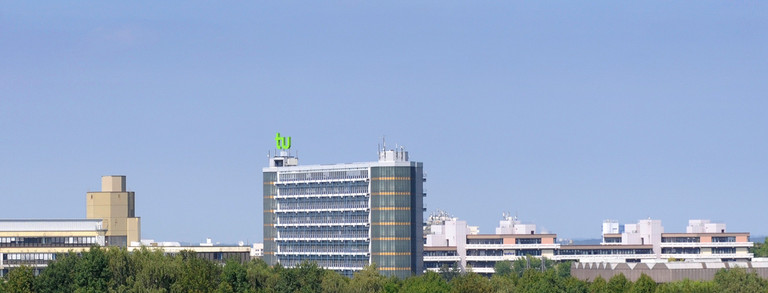TU Postdoc Chosen for EU’s Marie Curie Fellowship
- Top News
- Research
- People

Proteins are some of the most important building blocks for living organisms, functioning as enzymes, receptors, nanomotors, and transporters. These biomacromolecules have inspired the creation of numerous artificial molecular systems and materials that mimic their biological structures and behaviors. “However, replicating their dynamic behaviors and intra-protein communication pathways remains a significant challenge,” says Dr. Aleksandr Mikherdov, postdoctoral researcher at the Chair of Bioinorganic Chemistry led by Prof. Guido Clever. “For example, if an effector molecule binds in a pocket of a protein, a so-called allosteric binding site, it transmits the signal through its structure, generating structural changes which can alter the properties of the protein or induce a reaction. In my research project, I would like to replicate this intra-protein communication in coordination cages.”
Developing Intra-Cage Communication
Coordination cages are artificial supramolecular systems consisting of organic ligands that self-assemble in a cage-like structure, mediated by a metal ion – one of the research specialties at the Chair of Bioinorganic Chemistry. They may be used for molecular recognition, separation, transport, catalysis, and the stabilization of reactive or toxic species. In his project “CageComm: Engineering Directional Communication Pathways in Coordination Cages”, Mikherdov will develop a mechanism for intra-cage communication: A receptor cage will receive input from a stimulus, for example light or a reagent, and directionally transmit the signal to a reporter cage. The transmission then triggers, for example, the coordination cage to change its structure, to bind another molecule, or to alter its properties, such as the spectrum, intensity or polarization of emitted or absorbed light.
With his research, the postdoc aims to further advance artificial coordination cages, bringing them even closer to the complexity and multifunctionality of natural biomacromolecules. “Implementing protein-like mechanisms of communication will enable us to create more advanced systems with sophisticated functions,” Mikherdov explains. “For example, we could remotely control structural changes or develop a stimuli-responsive catalysis. It would also allow for a signal transfer across phase interfaces or non-linear responsiveness.” In the future, these systems could be integrated into both artificial materials and natural biological systems, making them valuable not only in supramolecular chemistry but also in a range of chemical disciplines, including biochemistry, soft matter science, catalysis, medicinal chemistry, and systems chemistry.
Prestigious Fellowship Awarded
Dr. Aleksandr Mikherdov, who received his PhD at Saint Petersburg State University in 2019 and has worked as a postdoctoral researcher at Hokkaido University in Japan since 2021, joined TU Dortmund University in July 2024. With his research project CageComm, he was able to secure one of the prestigious MSCA Postdoctoral Fellowships. The project is scheduled to begin in July 2025 and will continue for two years. The funding program targets excellent postdoctoral researchers who wish to carry out their research activities in the EU or a Horizon Europe state and want to acquire new skills as well as develop their careers. For the 2024 call, the European Research Executive Agency received 10,360 applications, of which 1,696 postdoctoral researchers were selected for funding. In total, the EU has awarded €417 million for the 2024 Postdoctoral Fellowships.
Contact for inquiries:





![[Translate to English:] Partner Four hands are holding the green logo of TU Dortmund University](/storages/tu_website/_processed_/1/d/csm_Partner_Nicole_Rechmann_KW_670eba0154.jpg)




![[Translate to English:] Forschung An apparatus with tubes in a laboratory](/storages/tu_website/_processed_/0/c/csm_Forschung_Juergen_Huhn_4fa3153b51.jpg)
![[Translate to English:] Studium Five students are sitting in a lecture hall. They are talking to each other.](/storages/tu_website/_processed_/c/9/csm_Studium_FelixSchmale_dbdbfb0dd7.jpg)






